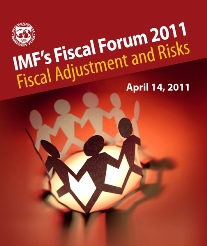By Abdelhak Senhadji, Emanuele Baldacci, and Jimmy McHugh [1]

Spring has come and the fiscal policy debate has blossomed: whether it will bear fruit is to be seen, in the meantime it is getting hotter by the day. With tensions from a two-speed recovery posing risks for the global economy, the challenges for policymakers around the world remain daunting.
Risks have changed from just a year ago, when government officials and prominent academics first met at the IMF in Washington for the inaugural round of the annual Fiscal Forum. At that time, fiscal stimulus to support the economic recovery was still a key worry, in particular in advanced economies, and participants debated how to get it right. At same time participants were concerned that increasing public debt did not lead to fiscal sustainability problems.
At this year’s second gathering of the Forum, fiscal adjustment featured prominently in the discussion and a sense of urgency for shifting gear in the policy stance was shared. This however does not mean that all countries would need to follow the same receipt: in fact the multi-speed economy may entail and multi-speed response.
Policy tensions arising from an asymmetric global recovery were at the forefront of discussions: rightly so. No cookie-cutter approach would work and country-specific considerations need to inform policy design: this is the only way to generate support for needed fiscal reforms making plans’ implementation credible. Unfortunately, the weak recovery and frail financial sectors have constrained policy maker’s room for maneuver.
In advanced economies, public debt levels continue to rise, while risks from persistent financial sector fragility put pressure on countries to reduce deficits rapidly. But in many of these countries unemployment is still higher than before the crisis.
In emerging economies, growth has recovered quickly and some countries are now running at a pace that exceeds what they could naturally sustain without incurring the risk of overheating (and being forced to a painful sudden stop). In these countries, fiscal policy has turned more neutral, but more efforts are needed to ensure that revenue gains are not spent (remember, crises can always happen and countries need to be ready).
In low-income countries the imperative is to rebuild fiscal buffers that were used up during the crisis to protect these economies from the shock. At the same time, fiscal space in these countries would have to be used for financing the needed infrastructure plans without jeopardizing sustainability.
Food and fuel price spikes also pose further difficulties. With potent risks obscuring the global outlook, how should policy makers craft adjustment plans? Three key topics emerged during the Forum which will drive the agenda over the next months: the pace of the required fiscal adjustment, the quest for social cohesion and how to deal with budget pressures from population aging and demand for healthcare.
Should countries consolidate now?
Participants expressed uneasiness about delayed consolidation in the United States and Japan, underscoring the risk of a sudden rise in interest rates, possibly triggered by a loss of policy credibility. Professor Summers, however, highlighted the risks of tightening too soon. Since monetary policy rates in advanced economies are close to zero, a premature fiscal contraction could hurt the recovery. But not all advanced economies can wait: peripheral euro area countries were forced to frontload fiscal adjustment by market pressures.
Tackling the challenges of increasing public debts requires good medium-term plans: these should be based on solid fiscal reforms and specific measures to deliver debt reduction through a combination of higher taxes and lower expenditures. Barring these, financial markets could get nervous about sovereign credit risks, even in countries with solid credit ratings.
Many advanced countries are now moving decisively towards fiscal consolidation, either through expenditure-based adjustments (as in many euro-area countries); or a mix of frontloaded revenue measures and expenditure reductions as in the United Kingdom. Fiscal plans have been accompanied in some cases by reforms to strengthen fiscal institutions: in these respect, fiscal rules are getting traction around the world.
Things are different for emerging economies. Here debt levels have not increased much and public finances are in better shape than in advanced economies. However fiscal positions have not yet recovered the pre-crisis levels. In addition, with inflationary pressures increasing, the imperative to consolidate fiscal positions is also growing. Some emerging countries—especially in Latin America—have enhanced the coordination between fiscal and monetary policy. With tight fiscal policies during the commodity boom, they have been able to maintain low interest rates and stem speculative capital inflows.
The need for socially-inclusive adjustment
Participants highlighted the imperative of growth-friendly and socially-inclusive fiscal adjustments. Current plans try to be sensitive to the social impact of consolidation. Egypt intends to focus on job creation, Chile’s adjustment plan has ring-fenced social programs, and France has prioritized long-term education expenditure. In this regard, previous country experiences can be a useful guide: the Turkish fiscal adjustment during 2003-05 was a success as reflected in lower public debt, higher growth and business confidence.
But making a dent in unemployment can be challenging, in particular if jobs that have been shredded during the crisis are not recreated and individuals lose their skills. Programs to help the unemployed acquire the skills needed in the post-crisis economy are important, but their design is not easy and fiscal costs can be large.
Health care reform – the key long term challenge
Fiscal sustainability is also complicated by long-term challenges associated with demand for healthcare and population aging. Their fiscal implications are potentially more damaging than the impact of the crisis. Prof Reinhardt warned that healthcare sector reform remains an “intractable problem”. In many countries, the political constraints to reform seem insurmountable.
One the one hand, there is a need for government involvement due to asymmetric information and general public agreement that healthcare should be universally accessible. At the same time, healthcare is consuming an ever-increasing proportion of GDP. It should be acknowledged that the sector is both labor-intensive and exhibits slow productivity growth. Therefore, the relative costs of health services will inevitably increase relative to other high productivity growth sectors. But new and improved medical procedures have greatly increased the demand for health services, generating further expenditure pressures.
Bold and brave action is needed by governments to make costs manageable and guarantee fair access to services. There is a positive note from the Forum, though. The assessment for pension reform was more positive. Progress has been made towards limiting pension entitlements, as many countries have introduced multi-pillar systems, reduced entitlements, raised the retirement age, and eliminated or reduced early retirement opportunities.
The way forward
Many stressed that strong institutions can help contain government spending, and support consolidation efforts. Institutional reform helps, but it is not a panacea. These reforms in isolation cannot guarantee successful adjustment. Rules limiting debts and deficits are often associated with better economic results. Nevertheless, there are also examples of countries that enjoy good fiscal performance without the benefit of fiscal rules. Independent agencies, like the Congressional Budget Office in the United States and the Office of Budget Responsibility in the United Kingdom, can help assess fiscal risks. But what it takes above all is well-designed measures that are perceived to be credible and fair. Not an easy task ahead: perhaps will see some results by the time of the next Forum?
[1] Division Chief, Deputy Division Chief, and Senior Economist, respectively, of the Fiscal Operations Division 1 of the IMF’s Fiscal Affairs Department.
Note: The posts on the IMF PFM Blog should not be reported as representing the views of the IMF. The views expressed are those of the authors and do not necessarily represent those of the IMF or IMF policy.






